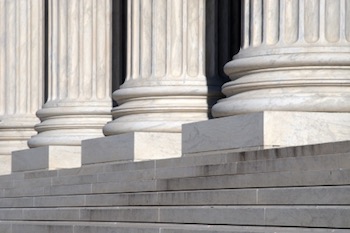 Earlier today the United States Supreme Court issued a unanimous decision authored by Justice Kagan in Kirtsaeng v. John Wiley & Sons, Inc., which forced the Court to address questions surrounding awarding attorney’s fees to the victorious party in a copyright infringement litigation.
Earlier today the United States Supreme Court issued a unanimous decision authored by Justice Kagan in Kirtsaeng v. John Wiley & Sons, Inc., which forced the Court to address questions surrounding awarding attorney’s fees to the victorious party in a copyright infringement litigation.
17 U.S.C. 505 gives district court’s the discretion to award attorney’s fees to the prevailing party in a copyright infringement litigation. §505 says, in pertinent part, that district court judges “may… award a reasonable attorney’s fee to the prevailing party.” The question before the Supreme Court was whether a district court should give substantial weight to the objective reasonableness of the losing party’s position when exercising discretion to award attorney’s fees.
Not surprisingly for those who have been following the Supreme Court’s patent jurisprudence relative to statutes containing permissive language, the Supreme Court continued its trend saying that district courts have broad discretion to award attorney’s fees to the prevailing party, or to not award fees. In exercising this discretion the Supreme Court held that district courts should consider the objective reasonableness of the losing party’s position, but that the objective reasonableness was not the only factor, or even the predominant factor, for district courts to consider. Rather, the Supreme Court explained that district courts retain broad discretion to make an award even when the losing party advanced a reasonable claim or defense.
[Supreme-Court]
In this regard, the Supreme Court explained:
All of that said, objective reasonableness can be only an important factor in assessing fee applications—not the controlling one. As we recognized in Fogerty, §505 confers broad discretion on district courts and, in deciding whether to fee-shift, they must take into account a range of considerations beyond the reasonableness of litigating positions. That means in any given case a court may award fees even though the losing party offered reasonable arguments (or, conversely, deny fees even though the losing party made unreasonable ones).
To illustrate a situation where the district court may exercise discretion to award attorney’s fees even though the positions taken were objectively reasonable, the Supreme Court said that a district court may choose to award fees for litigation misconduct even though the claims or defenses themselves were objectively reasonable.
Also noteworthy perhaps, the Supreme Court explained that considering the objective reasonableness of the positions taken by the losing party, position urged by Wiley & Sons, was preferable in their view because it would allow those litigants with “strong legal positions to stand on their rights and deters those with weak ones from proceeding with litigation.” See page 7.
Although both decisions below concluded that objective reasonableness should be considered the Supreme Court explained that they were not entirely convinced that the lower courts fully appreciated the full scope of the discretion available to the district court judge to award, or not award, attorney’s fees pursuant to §505. Therefore, the decisions below were vacated and the case remanded for further consideration of the prevailing party’s fee application.

![[IPWatchdog Logo]](https://ipwatchdog.com/wp-content/themes/IPWatchdog%20-%202023/assets/images/temp/logo-small@2x.png)

![[Advertisement]](https://ipwatchdog.com/wp-content/uploads/2024/04/Patent-Litigation-Masters-2024-sidebar-700x500-1.jpg)

![[Advertisement]](https://ipwatchdog.com/wp-content/uploads/2021/12/WEBINAR-336-x-280-px.png)
![[Advertisement]](https://ipwatchdog.com/wp-content/uploads/2021/12/2021-Patent-Practice-on-Demand-recorded-Feb-2021-336-x-280.jpg)
![[Advertisement]](https://ipwatchdog.com/wp-content/uploads/2021/12/Ad-4-The-Invent-Patent-System™.png)






Join the Discussion
No comments yet.